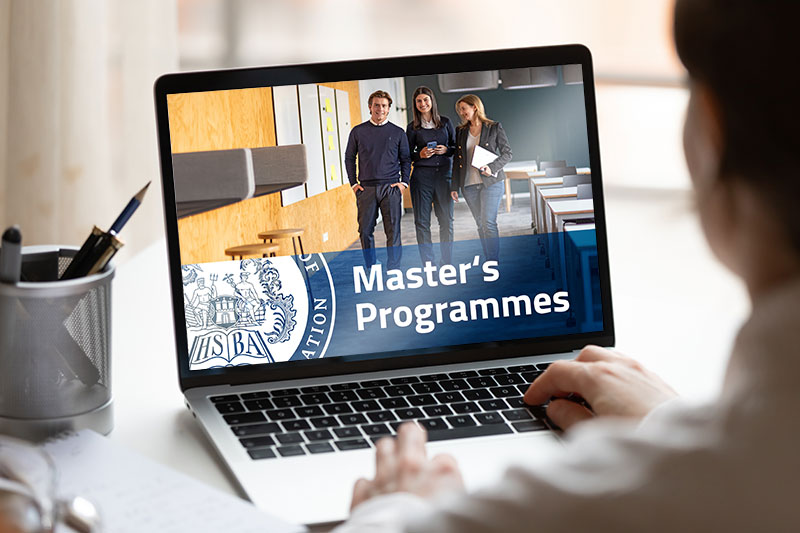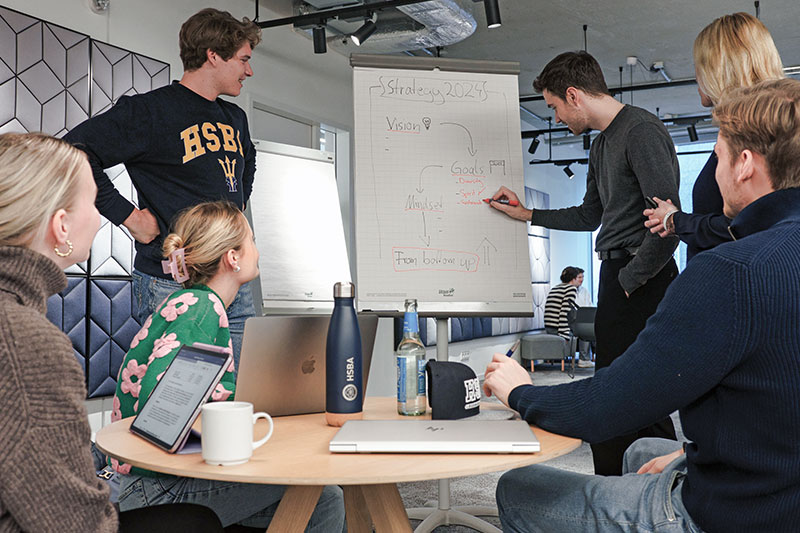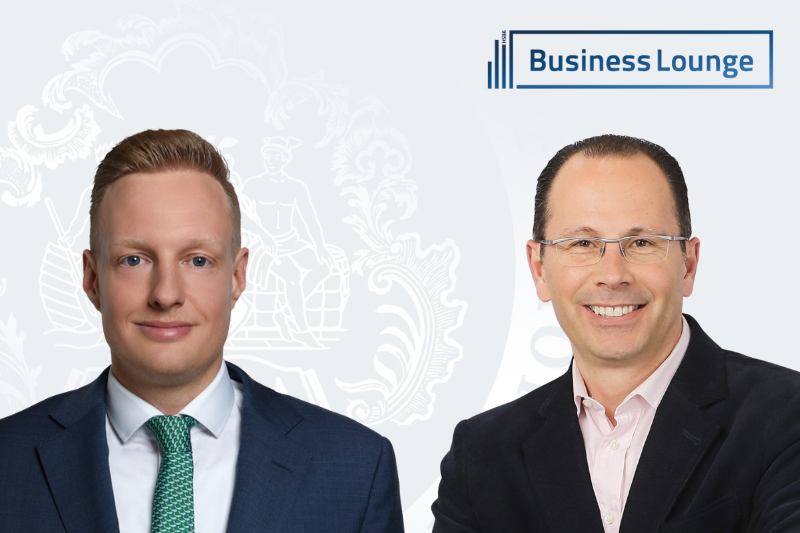
Business administration studies with an internationally recognised Master's degree (MSc) in Innovation Management at the dual business school in Hamburg
Do you already have a Bachelor's degree and are looking for an internationally oriented Master's programme in Hamburg? Our part-time Innovation Management degree programme is taught entirely in English and leads to an internationally recognised Master of Science (MSc) in five semesters. You will acquire around a third of the 120 ECTS in the Finance specialisation: In the Finance specialisation, you will first be introduced to advanced special topics in three modules that fit into the overall topic of innovation. This includes a look at start-up and VC financing as practised in Europe and other markets. Sustainable finance and its impact on the financial markets and corporate financing are also a central focus. The triad is rounded off by an in-depth insight into current trends in digital finance. As a rule, the three specialisation modules are followed by the Master's thesis in this area.
Business administration studies with an internationally recognised Master's degree (MSc) in Innovation Management at the dual business school in Hamburg
Multiple case studies
Several real-life projects
Teaching methods include Design Thinking, Kanban, Agile and Scrum
Study trip to an international destination in the 2nd semester
JOB & MASTER Service: JOB & MASTER is a free-of-charge placement service for applicants who wish to combine a challenging academic education at HSBA with valuable professional experience.
Mentoring Programme: Students are matched with experienced HSBA Alumni from the Hamburg business community, offering to be ideal sparring partners / role models.
Campus in the heart of Hamburg
To successfully complete the programme and be awarded the Master of Science degree, 120 ECTS must be collected. The credits are spread over ten modules in the first year and eight modules in the second study year. The programme concludes with the thesis. Teaching takes place on extended weekends and during a few full-time weeks per semester. On average, the weekly study workload amounts to 15 to 20 hours.
Understanding how innovation leads to market success is key for business development and management. As such, the course will lay the foundations of innovation management by introducing models for understanding the diffusion process of innovation within society.
Communication, methodical rigour and negotiation techniques are soft skills that are necessary for success in the professional world. These competences prepare students for a world in which structured work, communication and negotiation are key to managing their careers. Whether scientific writing or a business model as a concise form of storytelling or a multilateral negotiation: the module prepares students for the world of work with practical exercises.
Successful use of AI tools requires a basic understanding of programming. The introduction to Python also familiarises newcomers with the most important concepts and basics for complex applications.
This module teaches students about distributions, tests, data architecture, SQL, big data approaches, significance and stochastic modelling.
Innovations in product and business development always harbour financing challenges. This module lays the foundations for understanding the financing of innovations in an international environment.
Understanding the needs of users and pivot toward well-designed solutions through ideation, prototyping and testing is therefore the focus of this course. The application of design challenges and product/ service designs is implemented in student projects working in a design lab setting.
Students can choose between four study trips (subject to change) and are themselves in charge of the planning, organisation and implementation of their excursion.
Students will be familiarised with the latest methods and developments in project management. In the key part of this module students will learn to apply Design Thinking, Kanban, PPS, Scrum and other methods to project management. A particular focus will be on visualisation and a variety of supportive IT tools.
This module aims to introduce students into the data-driven and results-oriented quantitative modelling of econometrics. Widely spread models of Statistics and Econometrics are considered. The goal is to provide students with an understanding of the rational of quantitative models through applications as well as to apprehend the limitations of such modelling. Furthermore, the students should be able to develop their own applications by analysing a problem, making the necessary assumptions and synthesising knowledge gained into a meaningful result-oriented application.
The financial industry is highly influenced by FINTECH innovations. This module provides students with a comprehensive understanding of mergers and acquisitions (M&A) in the context of market developments, strategic and financial considerations as well as in-depth insights into valuation methods for start-ups. The module covers various aspects of M&A, private equity, venture capital and start-up financing and provides students with the knowledge and skills to analyse, execute and evaluate M&A and venture capital transactions as well as assess the value of early stage companies.
Using case studies, theoretical concepts of innovation management are analysed for their potential applicability in a real environment.
In small groups, students are assigned a project for a partner company. The company provides the real-life context of a challenge. The groups act as consultants to the company and present a consistent solution for the challenge at the end of the semester to the company. The groups are assisted by professors in their analytical, strategic and preparatory work.
The topic of this module is to identify the impact of digital technologies and innovations on firm behaviour, business models and market outcomes. Special emphasis will be put on networks and platforms. Finally, the module will discuss the benefits and possible pitfalls of digitisation for the economy and will furthermore address the topic of regulation and government intervention in digital markets.
This module introduces the topics sustainability and compliance. Both are cross-sectoral themes relevant to managers, employees and other stakeholders of any type of organisation. Fundamental theories and definitions of both topics will be introduced and potentials for business development and innovation as well as challenges and opportunities for investors and other actors in financial markets discussed.
Jobs continue to evolve under the influence of technological, socio-economic, political and demographic changes. What and how work is done is subject to innovative changes. This module examines how digitalisation, the dynamics of today's business environment are impacting and changing work itself, the organisation of work and workplace relationships. The course offers perspectives and insights into the future of work.
This research seminar prepares students for their master thesis.
Sustainable finance has become an important trend in recent years. Sustainable finance itself is an umbrella term for many related trends in finance. The course therefore begins with an introduction to the terms sustainability and sustainable finance and an overview of the associated regulatory activities. The two major areas of sustainable investment and sustainable corporate finance - including ESG scores - are then dealt with in detail. Sustainable corporate finance includes special instruments such as green bonds or sustainability-linked loans.
The digitalisation of the economy and companies is impacting the finance function in various ways: Business models are becoming increasingly digital and need to be monitored appropriately in terms of their financial performance. Similarly, many business functions are becoming more comprehensive and are drawing from more and more diverse sources. More and more digital tools are being used in the finance function itself. The term "digital finance" serves as an umbrella term for how the finance function needs to adapt to the above trends. The course also provides an overview of relevant theoretical foundations of AI and machine learning.
The Thesis concludes the postgraduate programmes at HSBA. Its results will be presented in the final Colloquium.
The business administration modules of the Master's degree programme focus on management and the design of successful business models and innovative measures in a rapidly changing world. You will learn how companies are managed strategically and financially and recognise the importance of careful analysis and flexible strategies in overcoming economic challenges and changes. The project modules are one of the highlights of the programme. Here you act as a consultant for real-life problems and apply the theory you have learnt on the course to business practice.
The programme includes the business administration modules Innovation Management and Strategic Business Development as well as the project management module, which teaches concepts such as design thinking, scrum and agile methods. Data Analysis focuses on IT tools and deals intensively with mathematics and statistics. Negotiation techniques and research methods are acquired in Scientific Methods & Competences and teach methodological and analytical skills. Sustainable Innovation & Compliance, Digital Economics and Applied Econometrics emphasise the need for comprehensive digitalisation and offer a combination of mathematically sound methodological development and extensive applied work with data. During the study trip, you will gain an international perspective on innovation culture and management in other countries.
Innovation Management with a focus on Finance is an exciting degree programme that opens up many opportunities for you. You will learn how to develop, evaluate and implement innovative financial solutions. You will deal with topics such as finance, innovation management, digitalisation, entrepreneurship and sustainability. You will combine theory and practice in exciting projects and collaborations.
Various areas of the financial sector will be open to you after graduation. You can design new business models, products or services for the digital transformation of the financial sector. Whether in banks and financial service providers, in fintech companies or in public institutions, you will have many opportunities. You can contribute your skills as a financial analyst, risk manager, product manager, innovation consultant, founder, managing director, developer, marketing manager, economic or financial policy maker, regulator or promoter.
A Master's degree in Innovation Management with a specialisation in Finance prepares you for a management position. It also promotes your personal and professional development. You will be a sought-after specialist in a dynamic and future-oriented industry.


After you have submitted your written application to us, you will go through our selection process. The process ensures that students have the personal, social and professional prerequisites needed to complete the study programme successfully.
Tip for international applicants and prospective students: You can find detailed information here and in our International Student Guide.




Would you like to address your questions directly to our students? Please contact Muriel Spanke (MSc Business Development) and Florian Kriz (MSc Digital Transformation & Sustainability) by e-mail. The two Master students will be happy to answer your questions!
The study programmes are part-time, so you study while working. Depending on the Master's programme, courses are held on individual weekdays or extended weekends and in individual full-time weeks in Hamburg.
Applications are possible at any time. However, since HSBA only has limited study places and funding programmes are partly awarded after receipt of the application, we recommend an early application for your Master's programme. If you want to apply for the JOB & MASTER offer at the same time, we recommend an early application to our university due to the longer procedure.
In the Master's programme Innovation Management (MSc), the courses take place on extended weekends and in individual full-time weeks at the HSBA in Hamburg. In the Master's programme Digital Transformation & Sustainability (MSc), the courses take place on two attendance days and in two full-time weeks at the HSBA in Hamburg.
